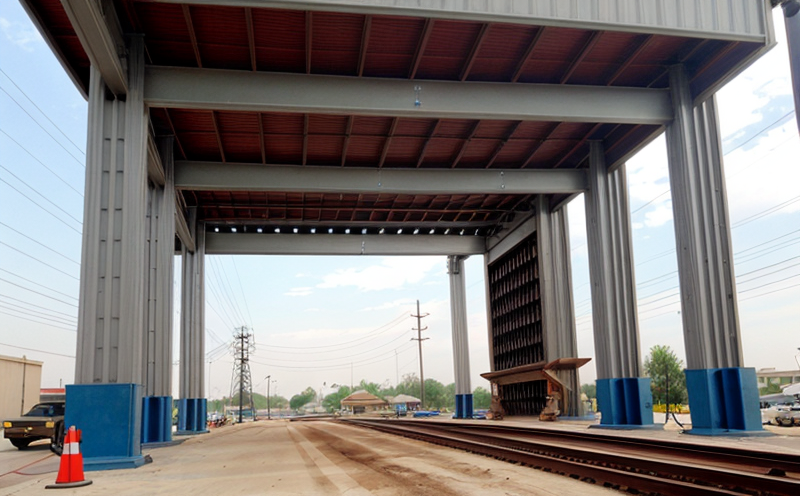EN 2823 Composite Material Tensile Testing for Aerospace
The European standard EN 2823 is specifically designed to address the unique challenges posed by composite materials in aerospace and aviation testing. These materials are essential components of aircraft, spacecraft, and other high-performance vehicles due to their lightweight, strength, and durability properties. This service focuses on providing comprehensive tensile testing according to EN 2823, ensuring that composite materials meet stringent quality standards.
The standard applies not only to the initial development phases but also to ongoing production processes and maintenance activities. It ensures that each batch of composite materials adheres strictly to specified properties and mechanical performance requirements. This is particularly critical in the aerospace sector where safety and reliability are paramount.
Composite materials used in this testing can be made from various fiber types such as carbon, glass, or aramid, bonded with resins like epoxy or polyester. These composites are characterized by their anisotropic properties, meaning that their strength varies depending on the direction of the applied force. This makes tensile testing crucial for understanding how these materials will perform under real-world conditions.
Tensile testing involves subjecting a specimen to gradually increasing tension until it breaks or deforms beyond acceptable limits. For composite materials, this process must account for both the fiber and matrix components. The test setup typically includes grips capable of holding the sample securely while applying controlled loads. Specialized equipment is needed to accurately measure elongation at various stress levels.
The testing procedure outlined in EN 2823 specifies precise methods for preparing specimens, mounting them into the testing machine, and recording data points throughout the experiment. Compliance with these procedural guidelines ensures accurate results that can be compared across different laboratories or batches of material.
Once completed, detailed reports are generated summarizing key findings from each test run. These documents provide valuable insights into how well individual lots of composite materials meet specified performance criteria. They also help identify any potential issues early on so corrective actions can be taken before they become serious problems in manufacturing or operation.
In summary, EN 2823 composite material tensile testing plays a vital role in ensuring the quality and safety of aerospace components manufactured from advanced composites. By adhering to this internationally recognized standard, manufacturers can demonstrate their commitment to producing reliable products that meet high industry expectations.
Industry Applications
- Aerospace component manufacturing
- Spacecraft structural integrity assessments
- Aviation part quality assurance programs
- Maintenance and repair operations for aircraft fleets
- R&D projects focusing on new composite material formulations
- Supplier audits and qualification processes
- Compliance checks with international aviation regulations
The application of EN 2823-compliant tensile testing extends beyond just the aerospace industry. It is equally important in sectors where similar materials are used, such as automotive, sports equipment manufacturing, and defense systems.
Eurolab Advantages
At Eurolab, we pride ourselves on delivering world-class composite material tensile testing services based on EN 2823. Our team of experts uses state-of-the-art equipment to ensure accuracy and reliability in every test conducted.
We offer a range of support services including consultation on specimen preparation methods, training sessions for personnel involved in the testing process, and assistance with interpreting results from these tests.
Our facilities are equipped with some of the most advanced testing machines available today. These include systems capable of applying high forces while maintaining precise control over temperature and humidity conditions during the test procedure.
We also provide detailed reports that go beyond simple pass/fail conclusions by offering in-depth analyses of key performance indicators such as modulus of elasticity, yield strength, ultimate tensile strength, and elongation at break. This level of detail allows our clients to fully understand their materials' behavior under load.
Moreover, Eurolab maintains strict adherence to international standards like EN 2823, ensuring that all tests performed align perfectly with industry best practices. Our commitment to quality is reflected in the certifications held by many members of our staff and the accreditation status of our laboratories.
Why Choose This Test
Tensile testing according to EN 2823 is essential for several reasons:
Ensuring Safety: The aerospace industry places an extremely high value on safety. By conducting rigorous tensile tests, we can identify any weaknesses or flaws within composite materials that could lead to catastrophic failures.
Promoting Reliability: Reliable products are crucial for maintaining trust between manufacturers and customers in the aviation sector. Consistent compliance with EN 2823 helps build this confidence by demonstrating adherence to recognized standards.
Supporting Innovation: As research into new composite materials continues, it is vital that they undergo thorough evaluation against established benchmarks like those provided by EN 2823. This allows developers to refine their designs based on empirical evidence gathered during testing.
Facilitating Compliance: Many regulatory bodies require compliance with specific standards when certifying products for sale or use in certain applications. Meeting these requirements through proper tensile testing ensures that your company remains compliant and avoids costly penalties.
Enhancing Reputation: Companies recognized as leaders in their field often rely on robust quality assurance measures like EN 2823-compliant tensile tests to enhance their reputation among clients, investors, and other stakeholders.





